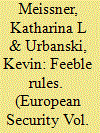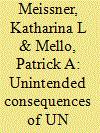| Srl | Item |
| 1 |
ID:
184112


|
|
|
|
|
| Summary/Abstract |
Export controls of dual-use products and sanctions on respective items are highly regulated in the European Union (EU). However, we find multiple instances of implementation and application problems of dual-use control in the Member States. To explain this puzzling observation, we investigate the relationship between the institutional design of sanctions and their subsequent implementation and application. Drawing on rational design theory, we argue that even if coherence is the EU’s stated goal, the institutional design of the current dual-use export control regime is inadequate to provide for coherence. National licensing decisions and a constant need for the interpretation of contingent rules in the implementation and application of dual-use sanctions are structural challenges to establish a coherent European policy. The relationship between institutional design and coherence, which we investigate in the context of sanctions, is not specific to the EU. Instead, we offer a novel conceptual and analytical tool to study the expected degree and causes of (in-)coherence in the implementation and application of any regime of international sanctions.
|
|
|
|
|
|
|
|
|
|
|
|
|
|
|
|
| 2 |
ID:
189268


|
|
|
|
|
| Summary/Abstract |
Sanctions are widely used foreign policy tools in reaction to crises in world politics. Accordingly, literature on sanction effectiveness—their intended consequences—is abundant. Yet, fewer studies address the unintended consequences of restrictive measures. This is remarkable given that negative externalities are well documented. Our article explores this phenomenon by asking under which conditions sanctions yield negative externalities. We develop a theoretical conceptualization and explanatory framework for studying the unintended consequences of UN sanctions. Empirically, we draw on data from the rich, but scarcely used Targeted Sanctions Consortium and apply qualitative comparative analysis (QCA) to examine negative externalities of UN sanctions, complemented by illustrations from the cases Haiti and North Korea. The results document the existence of multiple pathways toward unintended consequences, highlighting the negative impact of comprehensive and long-lasting sanctions, as well as the ability of autocratic targets with economic means to persist unscathed from sanctions.
|
|
|
|
|
|
|
|
|
|
|
|
|
|
|
|